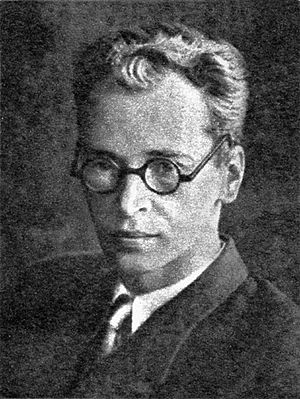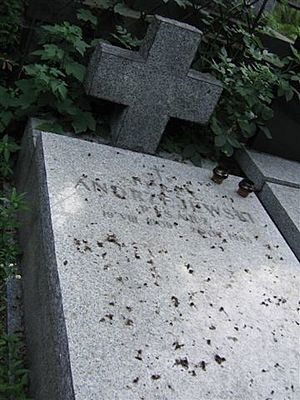Jerzy Andrzejewski facts for kids
Quick facts for kids
Jerzy Andrzejewski
|
|
|---|---|

Jerzy Andrzejewski in 1949
|
|
| Born | 19 August 1909 Warsaw, Vistula Land, Russian Empire
|
| Died | 19 April 1983 (aged 73) |
| Citizenship | Russian, Polish |
| Known for | Ashes and Diamonds |
Jerzy Andrzejewski (born August 19, 1909 – died April 19, 1983) was a very important Polish writer. He wrote many books and stories. His works often explored difficult moral questions. He wrote about important historical events, like World War II.
Two of his most famous novels are Ashes and Diamonds and Holy Week. These books were made into movies by the famous Polish director Andrzej Wajda. Both Holy Week and Ashes and Diamonds have been translated into English.
Contents
Life and Writing Journey
Jerzy Andrzejewski was born in Warsaw in 1909. He studied philology at the University of Warsaw. Philology is the study of language and literature. In 1932, he published his very first short story. It was called Wobec czyjegoś życia.
In 1936, he released a collection of short stories. It was titled Drogi nieuniknione. He soon became well-known for his novel Ład serca from 1938. This book was inspired by Catholic ideas.
Helping Others During World War II
During World War II, Andrzejewski helped Jewish refugees. His short novel Holy Week (1945) is very important. It was one of the first books to look at how Poles acted during the Holocaust. The Holocaust was a terrible time when many Jewish people were persecuted.
Post-War Works and Political Views
Right after World War II, Andrzejewski published a book called Night (Noc, 1945). Then came his most famous novel, Ashes and Diamonds (Popiół i diament, 1948). This book is about Poland right after the war.
Andrzejewski joined the Polish United Workers' Party in 1950. This was the ruling political party at the time. However, he left the party after the 1956 protests in Poland. He later became a strong supporter of freedom.
In 1964, he signed a letter to the Prime Minister. This letter was about the importance of cultural freedom. In 1976, he helped start an opposition group called KOR. This group worked to protect workers' rights. Later, Andrzejewski strongly supported the Solidarity movement. This movement was against the Communist government in Poland.
He was often thought to be a possible winner of the Nobel Prize in Literature. This is a very high honor for writers. However, he never received the award. Jerzy Andrzejewski passed away in Warsaw in 1983.
His Lasting Impact
Andrzejewski's writings during the war inspired the Anti-Nazi Home Army. His later work was also very important. His writings are analyzed in Czesław Miłosz's book The Captive Mind. In that book, Miłosz refers to Andrzejewski as "Alpha."
On September 23, 2006, Jerzy Andrzejewski received a special award. He was given the Commander's Cross of the Order of Polonia Restituta. This award was given to him after his death by Polish President Lech Kaczyński.
List of His Books
- Unavoidable Roads (Drogi nieuniknione, 1936), a collection of short stories
- Mode of the Heart (Ład serca, 1938), his first novel, which won an award
- Night (Noc, 1945) which includes Holy Week
- Ashes and Diamonds (Popiół i diament, 1948), the movie version won an award at the 1959 Venice Film Festival
- The Inquisitors (Ciemności kryją ziemię, 1957, translated in 1960)
- An Effective War (Wojna skuteczna, czyli Opis bitew i potyczek z Zadufkami, 1953)
- The Gates of Paradise (Bramy raju, 1960), a unique novel written almost without punctuation
- A Sitter for a Satyr (Idzie skacząc po górach, 1963) also known as He Cometh Leaping upon the Mountain
See also
 In Spanish: Jerzy Andrzejewski para niños
In Spanish: Jerzy Andrzejewski para niños


